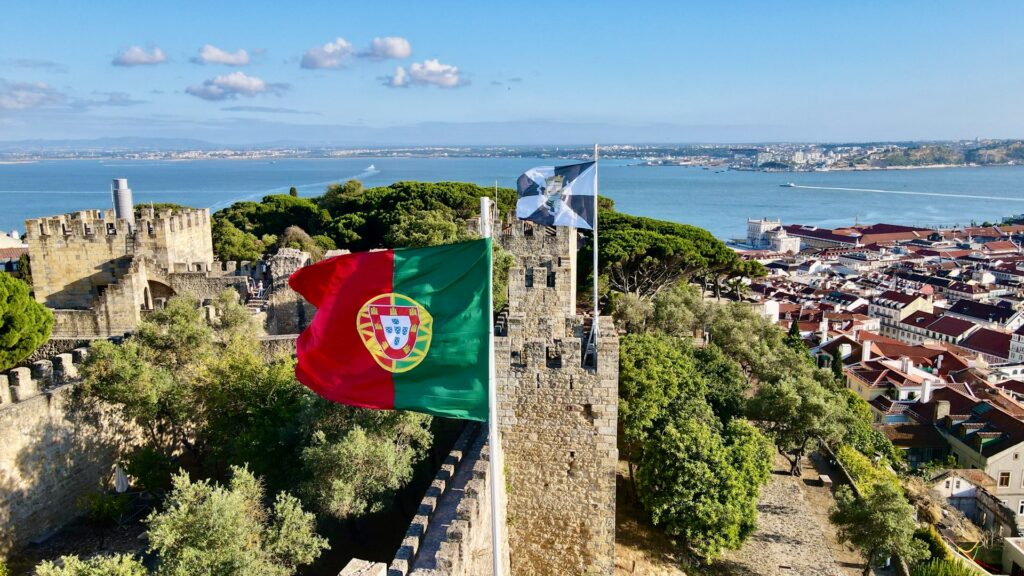Both the D7 Visa and the Golden Visa are highly sought-after programs for individuals seeking residency in Portugal. The D7 visa caters to individuals with passive income, while the Portugal Golden Visa requires an investment in the country. In this guide, we will provide clear insights to help you determine which option is better suited for your needs.
D7 Visa vs. Portugal Golden Visa: Program Overview
Portuga D7 Visa
Portugal D7 Visa, also known as the Retirement Visa or Passive Income Visa, was introduced in 2007 by the Portuguese government, allowing non-EU/EEA/Swiss citizens to apply for temporary residency in Portugal.
Retirees and individuals with a minimum regular minimum passive income of €870 per month can apply for the Portugal D7 Visa. This income can include pensions, real estate, royalties, dividends, financial investment, or intellectual property.
Portugal Golden Visa
The Golden Visa program in Portugal provides an expedited pathway for individuals to obtain Portuguese citizenship by investment, thereby granting them a Portuguese passport. With this passport, individuals gain the freedom to live and work in any European Union country. Here are the Portugal Golden Visa investment options:
Investment funds: Contribution of €500,000 or higher, for the acquisition of units of investment funds under the Portuguese legislation.
Business Investment: Minimum investment of €500,000 for constitution or reinforcement of the share capital of a company in Portugal, combined with the creation of five permanent working jobs.
Scientific research: Transfer €500,000 or more for research investment in public or private scientific institutions participating in the national system.
Cultural heritage contribution: Known as the Cultural Golden Visa, donation of a minimum of €250,000 for investing in artistic output or supporting the arts, for reconstruction or refurbishment of the national heritage.
Job Creation: Incorporating a company and creation of at least, ten jobs positions.

D7 Visa vs. Portugal Golden Visa: Benefits
Both the D7 Visa and the Portuguese Golden Visa offer similar advantages; however, the main difference lies in the income and stay requirements. Here are the similarities between both programs:
Mobility: Visa-free entry and circulation through the Schengen Area.
Live, Work, Study: Once you become a resident in Portugal you are entitled to conduct any professional activity as an independent professional and you gain access to the National Education Service, schools, and vocational training.
Path to Citizenship: After five years of legal residency, you may apply for permanent residency or to citizenship. However, in this case you’ll have to pass a Portuguese language test.
Family Reunion: You are entitled to bring your family members. The following is the list of family members that may qualify for family reunification:
- Your spouse or partner.
- Your children under 18 years of age or incapacitated children of the couple or of one of their spouses/partners.
- Dependent children over 18, unmarried, and pursuing education qualify under this provision.
- Your parents or your spouse/partner’s parents if they are dependent on you.
- Your minor siblings.

D7 Visa vs. Portugal Golden Visa: Comparison
Stay Requirements
The primary distinction between these two programs lies in their residency requirements. D7 visa mandates residence of six to eight months annually, consecutively or non-consecutively, for eligibility. Considering individuals’ intentions to make Portugal their permanent residence, this requirement is reasonable for the D7 scheme.
In contrast, the Portugal Golden Visa program offers more flexibility regarding residency obligations. While Golden Visa holders can stay in Portugal indefinitely, they usually need to stay for just one week per year to maintain residency status.
For individuals who frequently travel, the residency stay requirement becomes a crucial factor in determining which program is most suitable for them.
Income Requirements
Another significant contrast between the Portugal Golden Visa and D7 lies in their financial requirements. The D7 visa mandates the submission of evidence showcasing a monthly passive income of €870, which must be consistent and derived from various sources such as intellectual property, dividends, interest, property rentals, or pensions.
Additionally to be eligible for D7 Visa in Portugal you must have sufficient means to reside in Portugal for one year, which is equivalent to €10,440, plus you need to add 50% of this amount for your partner and 30% for each dependent child. However, it’s essential to note that these figures are indicative, and immigration officers have discretionary powers in this regard. Therefore, having a higher proven income is advantageous.
In contrast, the Portugal Golden Visa program does not necessitate proof of regular income. Instead, applicants are required to make qualifying investments, typically ranging from €250,000 to €500,000, to meet the program’s criteria.
Application Process
With the D7 Visa, the application process begins at the Portuguese embassy in your home country. You’ll need to submit various documents, including your application, NIF number, Portuguese bank account details, travel insurance, and proof of accommodation. If you haven’t secured accommodation in Portugal yet, you can provide a statement from relatives or friends who reside there, confirming your stay with them. Alternatively, you’ll need a lease agreement for a minimum of 12 months.
Once you receive the initial visa from the embassy, you’ll need to visit the Portuguese immigration authorities in Portugal (AIMA) to convert your visa into a residence permit valid for two years. From starting the D7 visa process to moving to Portugal, it may take around six months.
In contrast, the Portugal Golden Visa process is much smoother. After making the investment and with the assistance of a certified lawyer, you can submit your application without the need to visit Portugal.

Fees of D7 Visa vs. Portugal Golden Visa
The government fee for the D7 visa ranges from €40 to €280, but you also have to consider renewal charges and legal expenses. If you decide to pursue the D7 Visa, the major costs you’ll face include securing a lease agreement, which may require non-residents to pay five to six months in advance between rentals and deposits, along with relocation costs, etc.
On the other hand, with the Portugal Golden Visa, the primary cost to bear is the investment itself. Additionally, you’ll need to factor in application and processing fees, which amount to €5,797 and €580 respectively.
It’s important to keep in mind that all the charges and costs mentioned above are subject to change.
Portuguese Citizenship via D7 Visa or Golden Visa Portugal
The D7 Visa and Portugal Golden Visa are primarily for residency purposes. However, after five years of continuous residency, both D7 and Golden Visa holders may qualify for Portuguese citizenship.
D7 or Portugal Golden Visa: Which One To Choose?
Portugal D7 Visa is better for you when:
- Your passive income remains stable and consistent
- You desire to reside predominantly in Portugal
- You’re not inclined to make significant investments immediately
- You are willing to spend a significant amount of time in the country.
Portugal Golden Visa is better for you when:
- You seek a robust backup plan for your future
- You’re required to maintain your primary residence elsewhere
- You’re prepared to make a substantial initial investment in Portugal
Why Work With us?
Local Expertise
We know Portugal. Due to our extensive local knowledge, we believe that concentrating our services in a single country destination is the best way to give you the most thorough and useful information.
Holistic Approach
One single channel of communication for the entire process. We provide you with a comprehensive service that covers all aspects of your move, from identifying the ideal residency visa to finding your new home or helping you to settle.
Transparent Service
We recommend what’s best for you based on an extensive process experience that saves time and money to clients. Our pricing is clear and competitive, and we don’t sell services that make us more money.
Simple Process
Technology plays a very important role in our company. We minimize our clients’ involvement in paperwork. We are customers ourselves and we know how to serve you.
Frequently Asked Questions About Portugal D7 Visa vs. Golden Visa
What is the main difference between the D7 Visa and the Portugal Golden Visa?
The D7 Visa is a residency visa primarily for individuals with passive income, while the Portugal Golden Visa is an investment immigration program that grants residency and citizenship rights to those who make a significant economic contribution to the country.
Which visa is better for obtaining Portuguese citizenship?
Both the D7 Visa and the Portugal Golden Visa can lead to Portuguese citizenship after five years of continuous residency, provided certain requirements are met.
What are the financial requirements for each visa?
The D7 Visa requires proof of regular passive income of €870 per month, while the Portugal Golden Visa necessitates making a qualifying investment in the country, typically ranging from €250,000 to €500,000.
Which visa is more suitable for retirees or those with passive income?
The D7 Visa is generally more suitable for retirees or individuals with stable passive income, as it does not require a significant upfront investment like the Portugal Golden Visa.
Are there any stay requirements for each visa?
The D7 Visa typically requires spending six consecutive months in Portugal each year, while the Portugal Golden Visa offers more flexibility in terms of residency requirements because it only requires seven days per year.
What are the application procedures for each visa?
The application process for the D7 Visa usually starts at the Portuguese embassy in the applicant’s home country, while the Portugal Golden Visa application can be submitted directly in Portugal, often with the assistance of a certified lawyer.
What are the government fees and other associated costs for each visa?
The government fees and associated costs vary for each visa, with the D7 Visa requiring fees for application processing and renewal, while the Portugal Golden Visa entails investment-related expenses, application fees, and legal fees.
Can family members be included in the D7 visa and Portugal Golden Visa applications?
Both the D7 Visa and the Portugal Golden Visa typically allow for the inclusion of family members, such as spouses and dependent children, in the visa applications.
How can I determine which visa option is best for me?
The choice between the D7 Visa and the Portugal Golden Visa depends on various factors, including your financial situation, investment preferences, long-term plans, and residency requirements. It is advisable to consult with immigration experts or legal professionals to determine the most suitable option for your specific circumstances.




